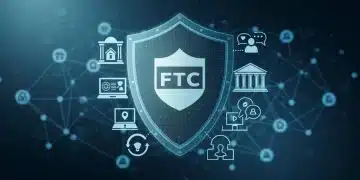Blockchain in governance: enhancing transparency and accountability

Anúncios
Blockchain in governance enhances transparency and accountability by utilizing decentralized technologies, smart contracts, and secure public services, revolutionizing how governments operate and engage with citizens.
Blockchain in governance is transforming how we perceive transparency and accountability in public systems. Have you ever wondered how technology could reshape the trust between governments and citizens? Let’s explore together.
Anúncios
Understanding blockchain technology
Understanding blockchain technology is crucial for grasping its implications in governance. At its core, blockchain is a decentralized digital ledger that records transactions across many computers. This means no single entity owns or controls the data, enhancing security and trust.
To put it simply, think of blockchain as a public library. Each book represents a block of information, and the library itself is the chain that connects all the books securely. This ensures that once something is recorded, it cannot easily be altered or erased.
Key Features of Blockchain Technology
Some of the significant features that make blockchain stand out include:
Anúncios
- Transparency: All participants can see the transactions, promoting accountability.
- Security: Advanced encryption techniques secure data against tampering.
- Immutability: Once a transaction is added, it cannot be changed retroactively.
- Decentralization: No central authority manages the network, preventing manipulation.
As you delve deeper into blockchain technology, it becomes evident how these features can transform governance. For example, in voting systems, blockchain can ensure votes are counted accurately and transparently. This builds trust between citizens and their governments, addressing concerns about corruption and fraud.
Furthermore, the potential for efficient public record-keeping through blockchain is immense. It allows for real-time updates and verified information, which can streamline many governmental processes. Think about how blockchain can improve the security of identities and property rights, making systems more resilient to fraud and available to everyone.
Ultimately, understanding the mechanics of blockchain technology reveals the promising changes it can bring to governance. By harnessing its power, societies can create more transparent and accountable systems that benefit all citizens.
The role of blockchain in public service
The role of blockchain in public service is becoming increasingly important as governments seek ways to enhance efficiency and transparency. By leveraging this technology, public institutions can improve their operations, making processes faster and more secure.
@blockchain allows for better tracking of resources, which is essential in public service sectors like healthcare and education. Imagine a system where patient records or student achievements are recorded on a blockchain, reducing paperwork and errors while enhancing accessibility.
Benefits of Using Blockchain in Public Service
Several key benefits arise when blockchain is applied to public service:
- Increased accountability: Every transaction is recorded and time-stamped, ensuring clear accountability.
- Cost efficiency: Automating processes with blockchain can reduce administrative costs.
- Enhanced security: Information is encrypted and stored across a network, making it less vulnerable to attacks.
- Citizen trust: Transparent processes foster greater trust between citizens and their governments.
Beyond the benefits, implementing blockchain in public service does come with challenges. These might include resistance to change and the need for training personnel in new technologies. However, the potential rewards are significant, promising better management of taxpayer funds and streamlining services.
As we look toward a future where blockchain plays a critical role in governance, it’s essential to focus on the real-world applications. For instance, public procurement can benefit from blockchain by making bidding processes transparent and minimizing corruption. Each bid can be verified and tracked, ensuring that all steps are open to scrutiny.
Integrating blockchain into public services is not just about technology; it’s about transforming how governments interact with their citizens. It encourages innovation and could lead to more citizen-centric services, addressing needs effectively and efficiently.
Case studies of blockchain in governance

Case studies of blockchain in governance showcase practical examples of how this technology is changing the landscape of public administration. Several governments worldwide are experimenting with blockchain to improve transparency, efficiency, and trust in their processes.
One notable example is the use of blockchain technology in Estonia. This country has implemented a digital identity system that allows citizens to access a wide range of services securely. With blockchain, personal information is encrypted and stored, ensuring that it remains safe and private.
Examples of Blockchain in Action
Here are some significant case studies:
- Georgia: This country has adopted blockchain for land registry. Each transaction is recorded on a blockchain, making it easy to verify ownership and reducing disputes.
- Dubai: The Government of Dubai plans to run all its documents on a blockchain by 2021, aiming to streamline processes and enhance efficiency.
- Venezuela: The country has implemented a blockchain-based system for managing the national pet registry, which helps track lost pets and connect them with their owners.
- US Elections: Some states are experimenting with blockchain voting systems to enhance security and make the voting process more transparent.
These examples illustrate how blockchain can address various governance challenges. They show that this technology is not just theoretical but has real-world implications that can lead to more effective and accountable government systems.
Additionally, as governments share their experiences with blockchain, other nations can learn from both successes and challenges. This collaborative approach can drive innovation across public sectors.
In summary, studying these case studies reveals the transformative potential of blockchain in governance. It highlights the need for more widespread adoption and adaptation of the technology to meet the evolving needs of societies.
Challenges of blockchain implementation
Challenges of blockchain implementation can be daunting for governments looking to leverage this technology. Although the benefits are clear, organizations must navigate various obstacles to achieve successful adoption.
The first challenge is the technological complexity of blockchain. Many public officials may not fully understand how blockchain works, leading to resistance and hesitance in implementation. Training personnel to use this technology is essential for overcoming initial barriers and ensuring effective use.
Common Challenges Faced
Some of the main challenges include:
- Scalability: As the number of transactions increases, blockchain systems may struggle to keep up, requiring solutions to manage higher loads effectively.
- Interoperability: Different blockchain systems may not communicate well with each other, creating silos that limit the potential benefits.
- Regulatory hurdles: Governments need to create frameworks that support blockchain, but regulatory ambiguity can slow down progress.
- Cost: Implementing a blockchain system can require significant financial investment, which may deter some public entities from proceeding.
Additionally, there are concerns about the ethical implications of blockchain technology. Although it promotes transparency, data privacy must remain a priority to protect citizens. Balancing these interests can be challenging for governments.
As blockchain continues to evolve, understanding these challenges becomes crucial for successful adoption. It is essential to engage with stakeholders, including technology experts, policymakers, and the public, to address concerns and create comprehensive solutions. By learning from early adopters and their experiences, governments can pave the way for a more efficient future.
Future trends for blockchain governance
Future trends for blockchain governance indicate that this technology will play a vital role in how governments operate and interact with their citizens. As more countries begin to recognize the potential of blockchain, innovation is ahead.
One trend is the growing adoption of smart contracts. These digital contracts automatically execute transactions once conditions are met. They can streamline processes in public services, reducing the need for intermediaries and making transactions faster and more secure.
Emerging Trends to Watch
Here are some key trends shaping the future of blockchain governance:
- Decentralized Identity Systems: Many governments are exploring ways to use blockchain for secure, decentralized identities. This can reduce identity theft and give citizens more control over their personal data.
- Interoperability Solutions: As different blockchain platforms emerge, the focus will shift to creating systems that can work together. This interoperability will help enhance efficiency and collaboration.
- Enhanced Public Participation: Blockchain can improve citizen engagement by enabling transparent voting systems. This can lead to higher trust in elections and public decision-making.
- Integration with AI: Combining blockchain with artificial intelligence can unlock new capabilities, such as predictive analytics & automated policy adjustments based on real-time data.
As the technology matures, regulatory frameworks will also evolve to support blockchain integration into governance. Governments must ensure they strike a balance between innovation and protecting citizens’ rights and privacy.
In addition, public awareness around blockchain will increase. Education about how this technology works and its benefits is crucial for fostering trust and usage in public systems. As more individuals understand blockchain, we will likely see increased demand for its adoption in governance.
In conclusion, the exploration of blockchain in governance reveals a path filled with opportunities for enhancing transparency and efficiency in public services. By addressing current challenges and embracing future trends, governments can transform their operations to serve citizens better. With the ongoing development of technologies like smart contracts, decentralized identity systems, and artificial intelligence integration, the potential for positive change is immense. As we move forward, it is essential to foster awareness and understanding of blockchain, ensuring that its benefits reach everyone.
FAQ – Questions about Blockchain in Governance
How does blockchain improve transparency in governance?
Blockchain creates a secure and immutable record of transactions, allowing everyone to see the data and fostering trust between citizens and the government.
What are smart contracts and how do they help?
Smart contracts are self-executing agreements with terms directly written into code. They automate processes in public services, reducing the need for intermediaries.
What challenges does blockchain implementation face?
Challenges include technological complexity, scalability issues, and regulatory hurdles that can slow down adoption in public sectors.
What are some future trends for blockchain in governance?
Future trends include the use of decentralized identity systems, improved public participation in decision-making, and integration with AI to enhance efficiency.





